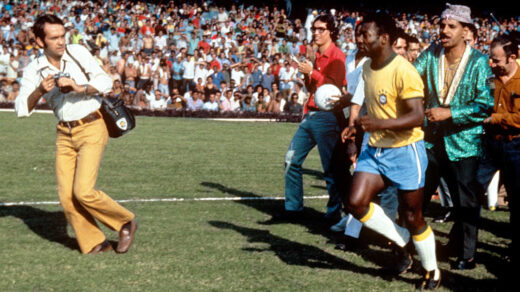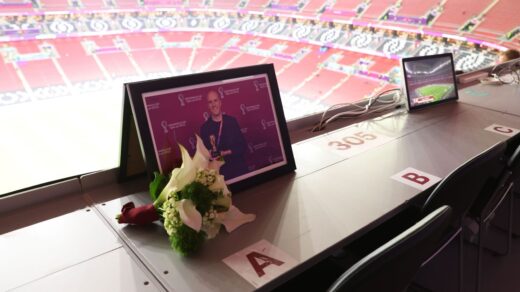Something in Bayern Munich’s DNA compelled them to keep going, but a 3-0 Manchester City lead from the first leg was too much for them.
Very much as expected, then, Manchester City are through to the semi-finals of the Champions League. Their 3-0 lead from the first leg of this Champions League quarter-final was a demonstration that they may be ready to finally ascend to the summit of European club football, with a semi-final now awaiting against Real Madrid, and against Bayern Munich they encountered considerable resistance but ran down the clock without too much difficulty. You may well hear the phrase “the real Champions League final” a few times over the next couple of weeks.
But Bayern Munich were at least never likely to lay down and surrender without putting up some sort of fight in the second leg – 70,000-odd screaming Bavarians were never going to let them get away with that – and they did create chances throughout a first half that was littered with low comedy.
It took less than twenty minutes for the costs of the recent fashion among referees’ assistants to flag as late as possible to become apparent, when Erling Haaland burst through the middle only for Dayot Upamecano to clatter into him and send him flying. The referee almost immediately ran over to the defender brandishing his red card, but this had to be rescinded after play was called back because Haaland had been offside.
And Haaland was involved in the other moment that defined a surprisingly effervescent first half. Upamecano, who hadn’t had much of a first leg in Manchester and who’d been involved in that near-miss with a red card earlier – he didn’t know Haaland when he approached him in the manner that he was offside – had his arms behind his back when Ilkay Gungodan took a shot at the Bayern Munich goal, but he moved them out, the ball flicked off him, and Manchester City had a penalty.
This, of course, was the cue for the commentators to adapt that slightly irritating, “oh, I just know what’s going to happen next” tone of voice (yeah, alright Nostradamus, we all know how good he is), only for Haaland to whack his penalty over the bar and high into the Bayern tifo.
By half-time the score was still goalless, and Bayern Munich’s task in overhauling Manchester City already looked somewhat hopeless. Their first half performance was excellent.
Had Manchester City only had a 1-0 lead from the first leg, we might have considered the tie to still be on a knife-edge. Had they led 2-0, we might have thought, “just one goal and they’re right back in this tie”. But three goals in 45 minutes against this time was always going to be a stretch too far.
And then Haaland took advantage of a mistimed slide by, you guessed it, Upamecano just before the hour and scored for City. Ten seconds earlier, the ball had been dribbling across the Manchester City goal after Ederson had been forced to make an excellent save from Eric Maxim Choupo-Moting.
Big Club Arrogance is a real thing, and while it may be insufferable for the supporters of other clubs, it’s invaluable to those who have it flowing through them. Success breeds success, which builds an expectation of more in the future, and over the time this seems to stain into a football club. Real Madrid are perhaps the best example of this. They seemed to win the Champions League last season by simply refusing to believe that they weren’t going to win it.
This season’s run to the semi-finals hasn’t been as dramatic as last season’s, but the effortlessness with which they’ve progessed through this year’s competition has been striking. Admittedly, the 2023 editions of Liverpool and Chelsea are some way off the sort of challenge you might expect from them, but Real Madrid glided past both clubs, winning all four matches, and both ties by four goals on aggregate each.
Bayern Munich have that arrogance. Not for nothing are they known in Germany as “FC Hollywood”, and they earned that nickname long before they won the Bundesliga ten times in a row. The huge tifo behind the goal before the match was another sign of a football club that is simply not used to being in this sort of position.
But on this occasion, the hurdle to overcome was simply too great. Haaland’s goal silenced the Allianz Arena. On this occasion, there really was no way back. Even when they did get the ball into the back of the Manchester City net with fifteen minutes to go, the offside flag went up against Kinglsey Coman.
Bayern Munich kept pushing and the flags behind the goal kept waving, but by this time it was starting to feel as though there might be a curse on them. Even when the Manchester City defence tried to assist a little with some wayward passing which resulted in the ball rolling toward their own goal, someone was on hand to clear up the mess. They kept going, because that’s what they do, with perhaps Thomas Tuchel’s most notable tactical switch of the second half his decision to replace Leroy Sane with Sadio Mane, a particularly spicy decision, considering that Mane split Sane’s lip during what might be described as an “altercation” following the first leg.
Eventually, eventually, they did find the back of the net. Mane’s appeal for handball against Manuel Akanji from a cross seemed more in hope than expectation, so imagine his surprise when the referee consulted with his monitor and gave the kick. Joshua Kimmich converted it, but although the goal raised the volume levels inside the stadium there was never any suggestion that this was finally going to be the start of some epic comeback.
Manchester City’s game management was more or less as much as they needed to just run down the clock. Tuchel looked as though he could have done with some game management himself when he got involved after a bad tackle in front of him and earned himself a second yellow card of the evening.
Is it fair to describe the semi-final between Manchester City and Real Madrid “the real final”? Well, yes and no. On the one hand, there seems little question that these two clubs have been the best in this year’s Champions League, certainly following the elimination of Benfica and Napoli this week. But Inter and Milan have won the Champions League ten times between them.
These two clubs have that same sense of grandeur that compelled Bayern Munich to keep going, even though their cause was so obviously lost. And complacency might even turn out to be the biggest enemy of the winners of that semi-final when the final comes around. We may at least get a definitive answer on how much Manchester City have progressed from the next hurdle they have to overcome in this year’s competition.




